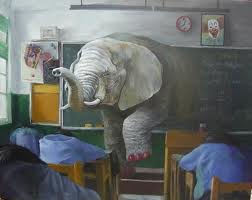Extraordinary Discourse 120 Special: Elephants In The School System
Elephants In The School System
The theme of schooling has played a part in this mural since the beginning: here it surfaces as the dominant theme for the duration of this associational documentary.
So here are the great educational mavericks, those powerful defenders of children who saw and named the elephants in the school system.
Links:
The Ultimate History Lesson, five hours with John Taylor Gatto
School Sucks Podcast
John Holt on YouTube
A. S. Neill on YouTube
1
What did you learn in school today,
Dear little boy of mine?
What did you learn in school today,
Dear little boy of mine?
I learned that Washington never told a lie,
I learned that soldiers seldom die,
I learned that everybody's free,
That's what the teacher said to me,
And that's what I learned in school today,
That's what I learned in school.
2
What did you learn in school today,
Dear little boy of mine?
What did you learn in school today,
Dear little boy of mine?
I learned that policemen are my friends,
I learned that justice never ends,
I learned that murderers die for their crimes,
Even if we make a mistake sometimes,
And that's what I learned in school today,
That's what I learned in school.
3
What did you learn in school today,
Dear little boy of mine?
What did you learn in school today,
Dear little boy of mine?
I learned our government must be strong,
It's always right and never wrong,
Our leaders are the finest men,
And we elect them again and again,
And that's what I learned in school today,
That's what I learned in school
4
What did you learn in school today,
Dear little boy of mine?
What did you learn in school today,
Dear little boy of mine?
I learned that war is not so bad,
I learned about the great ones we have had,
We fought in Germany and in France,
And someday I might get my chance,
And that's what I learned in school today
That's what I learned in school.
Tom Paxton
from
TEACHING AS A SUBVERSIVE ACTIVITY
Neil Postman & Charles Weingartner
No one is wise enough or good enough to mould the character of any child. What is wrong with our sick, neurotic world is that we have been moulded, and an adult generation that has seen two great wars and seems about to launch a third should not be trusted to mould the character of a rat.
A.S. Neill
One thinks of Blake’s drawing of “Aged Ignorance,” in which an old man with an idiot’s face is clipping the wings of a young Cupid struggling towards the rising sun.
Northrop Frye
Fearful Symmetry
At first this new attitude to time, this new regularity of life, was imposed by the clock-owning masters on the unwilling poor. The factory slave reacted in his spare time by living with a chaotic irregularity which characterised the gin-sodden slums of early nineteenth century industrialism. Men fled to the timeless world of drink or Methodist inspiration. But gradually the idea of regularity spread downwards among the workers. Nineteenth century religion and morality played their part by proclaiming the sin of 'wasting time'. The introduction of mass-produced watches and clocks in the 1850's spread time-consciousness among those who had previously merely reacted to the stimulus of the knocker-up or the factory whistle. In the church and in the school, in the office and the workshop, punctuality was held up as the greatest of the virtues.
Out of this slavish dependence on mechanical time which spread insidiously into every class in the nineteenth century there grew up the demoralising regimentation of life which characterises factory work today. The man who fails to conform faces social disapproval and economic ruin. If he is late at the factory the worker will lose his job or even, at the present day [1944 - while wartime regulations were in force], find himself in prison. Hurried meals, the regular morning and evening scramble for trains or buses, the strain of having to work to time schedules, all contribute to digestive and nervous disorders, to ruin health and shorten life.
George Woodcock
First published in War Commentary - For Anarchism mid-march 1944.
Even worse, a system of specialization requires the abdication to specialists of various competencies and responsibilities that were once personal and universal. Thus, the average --one is tempted to say, the ideal-- American citizen now consigns the problem of food production to agriculturists and "agribusinessmen," the problems of health to doctors and sanitation experts, the problems of education to school teachers and educators, the problems of conservation to conservationists, and so on. This supposedly fortunate citizen is therefore left with only two concerns: making money and entertaining himself. He earns money, typically, as a specialist, working an eight-hour day at a job for the quality or consequences of which somebody else --or, perhaps nobody else-- will be responsible. And, not surprisingly, since he can do so little else for himself, he is unable to entertain himself, for there exists an enormous industry of exorbitantly expensive specialists whose purpose is to entertain him.
Wendell Berry
The Unsettling of America: Culture & Agriculture
The thousands who study Shakespeare, Hardy, Tennyson help later to swell the millions who read the most sensational Sunday papers-- naturally. For in a school system which makes emotion inferior to intellect, the sensational tales of crime and sex touch the starved emotions.
A.S. Neill,
Neill, Neill, Orange Peel
And what is a good citizen? Simply one who never says, does or thinks anything that is unusual. Schools are maintained in order to bring this uniformity up to the highest possible point. A school is a hopper into which children are heaved while they are still young and tender; therein they are pressed into certain standard shapes and covered from head to heels with official rubber-stamps.
H.L. Mencken
Education...now seems to me perhaps the most authoritarian and dangerous of all the social inventions of mankind. It is the deepest foundation of the modern slave state, in which most people feel themselves to be nothing but producers, consumers, spectators, and 'fans,' driven more and more, in all parts of their lives, by greed, envy, and fear. My concern is not to improve 'education' but to do away with it, to end the ugly and antihuman business of people-shaping and to allow and help people to shape themselves.
John Holt
Authoritarian ethics answers the question of what is good or bad primarily in terms of the interests of the authority, not the interests of the subject. ...the fear of disapproval and the need for approval seem to be the most powerful and almost exclusive motivation for ethical judgement. This intense emotional pressure prevents the child, and later the adult from asking critically whether “good” in a judgement means good for her, or for the authority.
Erich Fromm
The magical child’s awareness of death unfolds in late childhood in the form of the child’s driving desire for autonomy--an awareness of being responsible for his or her own survival. If the child has been given the proper education in survival, this expresses itself as designed: a period of intensive and ecstatic play, in which varying the possibilities of one’s survival tools are explored, in which concrete operational thinking and enhancement of primary perceptions are practiced. This would mean confrontation: the child actively seeking the tests of his or her prowess. Is this the education he receives? Of course not! At this most critical time we slap the child into the anxiety-ridden and frightful experience of schooling--for the newly-born individual system, this is the equivalent of a violent birth, and the results are pretty much a repetition of that earlier trauma--brain damage, shock, intellectual crippling, and an overall depression that becomes permanent. The great promise with which the child was born is now shattered completely. Each generation produced under schooling proves more shocked, crippled, violent, aggressive, hostile, confused, defiant, despairing.
Joseph Chilton Pearce
Magical Child
What the school determines to accomplish it does so in a constant and total atmosphere of violence. We do not mean physical violence, we mean violence in the sense of any assault upon, or violation of, the personality. An examination or a test is a form of violence. Compulsory gym, to one embarrassed or afraid, is a form of violence. The requirement that a student must get a pass to walk in the hallways is violence. Compelled attendance in the classroom, compulsory studying in study hall, is violence. ...the amount of violence in a high school is staggering.
Charles A. Reich,
The Greening Of America
Under the sidewalk lies the beach!
Paris Grafitti



Comments
Post a Comment